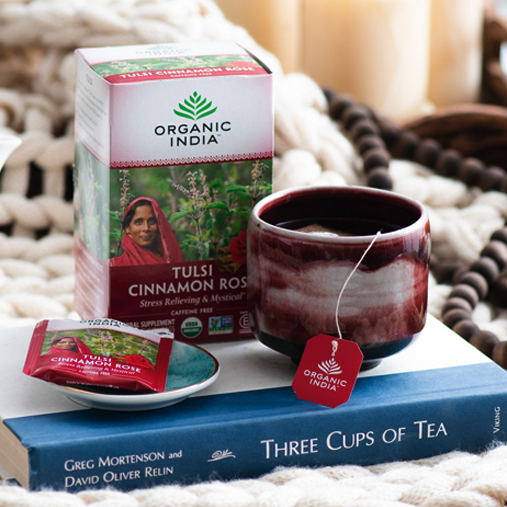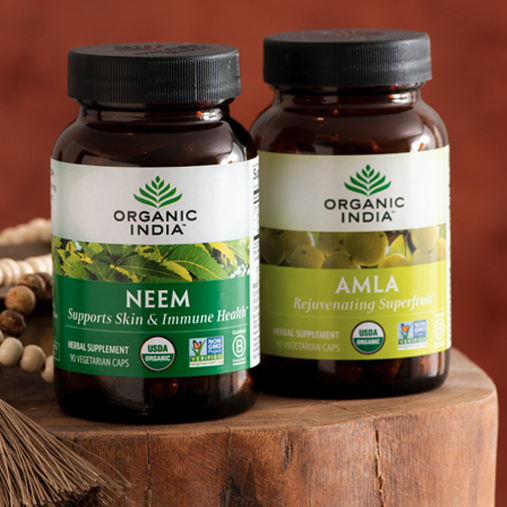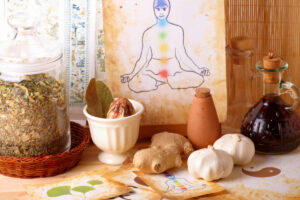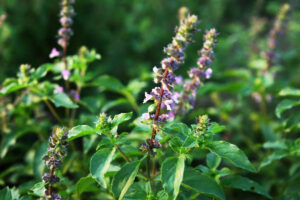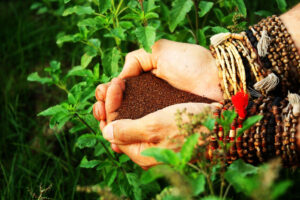Back
The Most Ancient Approach to Stress and Happiness
10/10/2019 |
Better World, Conscious Healthy Living, Uncategorized

By Vic Shayne, PhD, author of Stressing Out Over Happiness for ORGANIC INDIA
Stress is endemic to our modern world. It can be argued that this is largely due to living an unnatural lifestyle, but there is an upside to stress as well. It can be seen as the great motivator. Because stress leads to suffering, it becomes an impetus to know oneself beyond the egoic, conscious mind.
Vedic scholars teach that suffering “contains an energy to awaken us to our higher truth, to get us to question who we really are – what is our eternal identity in this transient world?…To experience suffering is to face the inherent limitation of material existence and physical life. We should not try to flee suffering but to understand it, to discover the truth of life that it reflects. Then suffering can liberate us into a lasting joy.”
Suffering also can be an opportunity to know compassion. The Dalai Lama said, “When you are aware of your pain and suffering, it helps you to develop your capacity for empathy, the capacity that allows you to relate to other people’s feelings and suffering. This enhances your capacity for compassion towards others. So as an aid in helping us connect with others, it can be seen as having value.”
As with all things in this world, we must come to a state of balance with stressful experiences that lead to suffering by learning how to address them naturally. Fortunately, the sages discovered holistic ways to work with the stress that has been entwined with the human condition down through the ages.
Our bodies have not evolved to adapt to the stresses that are heir to our unnatural lifestyles. This results in artificially induced imbalances that adversely affect the body and mind. But there’s a light at the end of the tunnel if one were to look for it. Many have embraced ancient Eastern practices, including eating unsullied whole food diets, meditating for both inner peace and self-enquiry, and consuming herbs such as ashwagandha and tulsi.
Stress and the Mind-body Complex
There is no greater example of the mind-body interaction than the cause-and-effect relationship between chronic stress and health issues. In part, this is because even modern medicine recognizes what stress leaves in its wake, and therefore we see a great many university studies showing how stress leads to the creation of certain chemicals in the body.
Medical researcher Mohammed Razali Salleh explained, “Stress is defined as a process in which environmental demands strain an organism’s adaptive capacity resulting in both psychological demands as well as biological changes that could place at risk for illness. Things that cause us stress are called stressors. Stress affects everyone, young and old, rich and poor. Life is full of stress. Stress is a fact of life that we must all deal with. It comes in all shapes and sizes; even our thoughts can cause us stress and make the human body more susceptible to illness.”
Although modern medicine is built upon a materialist paradigm, and is therefore resistant to accept the impact of emotions and spiritual health upon the body, it nevertheless admits to the effects of stress across the board. Stress creates hormonal issues, inflammation, heart disease, depression, anxiety, ulcers, and a litany of other problems — both serious and benign.
Instead of addressing the effects of stress with even more artificial modalities, many are turning to the ancient wisdom of India, where meditation and herbs have been used successfully for thousands of years. Two that have successfully stood the test of time are tulsi and ashwagandha, both of which are categorized as adaptogenic herbs.

Tulsi and Ashwagandha: Adaptogens for Stress
Adaptogenic herbs are non-toxic plants that are favored because they resist stressors, whether physical, chemical or biological. (Stressors are factors and substances that cause stress.) Brenda Powell, co-medical director of the Center for Integrative and Lifestyle Medicine at the Cleveland Clinic’s Wellness Institute, explained that “adaptogens help your body handle stress. “They’re meant to bring us back to the middle.” Powell noted that adaptogens are analogous to the way exercise works to strengthen the muscles. She said that “as we continue to train and exercise, our body becomes better at dealing with the stress of it, so we no longer get as tired or as high a heart rate.” Adaptogens help train your body “to handle the effects of stress.”
Researcher Marc Maurice Cohen wrote, “Of all the herbs used within Ayurveda, tulsi (Ocimum sanctum Linn) is preeminent, and scientific research is now confirming its beneficial effects. There is mounting evidence that tulsi can address physical, chemical, metabolic and psychological stress through a unique combination of pharmacological actions.” Tulsi has also been shown to counter psychological stress through positive effects on memory and cognitive function; and by helping with depression and anxiety.
Cohen also noted, “Cultivation of tulsi plants has both spiritual and practical significance that connects the grower to the creative powers of nature, and organic cultivation offers solutions for food security, rural poverty, hunger, environmental degradation and climate change. The use of tulsi in daily rituals is a testament to Ayurvedic wisdom and provides an example of ancient knowledge offering solutions to modern problems.”
The second adaptogenic herb of note is ashwagandha. India Today reported that the enlightened rishis — sages who have realized the intrinsic unity of life — considered ashwagandha “as one of the finest herbal medicines known to man. It has been revered for thousands of years in India’s Ayurvedic healing tradition.” The plant can potentially relieve stress and its effects in a variety of ways — promoting restful sleep, addressing depression and anxiety, increasing the brain’s acetylcholine levels to help improve memory, sharpen brain function and intelligence, regenerating nerve cells, and balancing hormone levels.
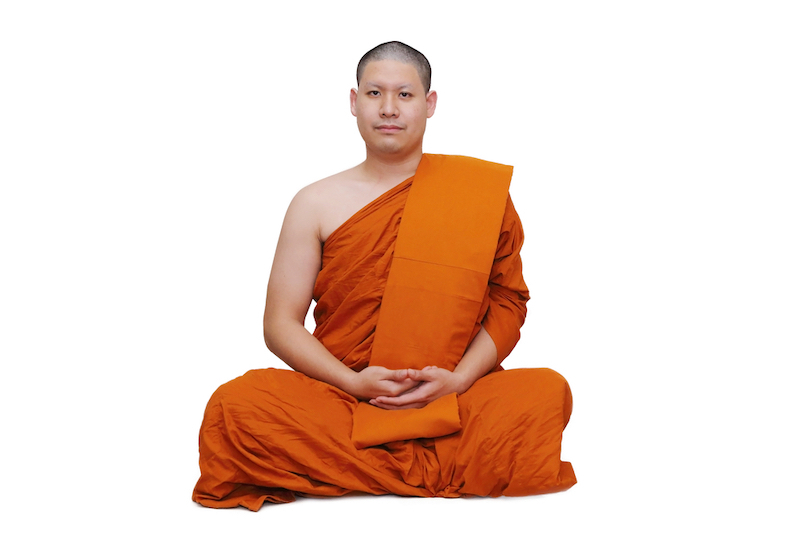
Meditation and Stress
The practice of meditation can be traced back to ancient India and is one of several components of the world’s oldest system of holistic healthcare. To this day, Ayurvedic practitioners still recommend a multi-pronged approach to rebalancing the body by bringing mind, body, and spirit into harmony. To complement the use of certain herbs, such as ashwagandha and tulsi, meditation (among other benefits) allows the mind to destress.
Psychology professor-turned-guru Ram Dass, wrote, “Meditation is a way of listening more deeply, so you hear how it all is from a more profound place. Meditation enhances your insight, reveals your true nature, and brings you inner peace.” He explained, “Chaos demands our attention. It’s like a bratty child, jealous of our peace. Chaos will do everything in its power to suck you in and keep your stress level high. With meditation, you can use the quietness of your mind to surround and subdue chaos. Let it go easily somewhere else, while you apply your energy to reaching out into the universe for answers. Let the answers come to you as easily as you let chaos go.”
Although stress may be unavoidable in our modern era, we still have the power to bring ourselves into alignment by recognizing that the mind and body mutually complement one another. This takes a return to what is natural through a mind-body approach. Sage wisdom has shown that balance can be achieved with the foods and herbs we consume, as well as how we perceive the world and find harmonious ways to relax and be attentive to who we are at the core. If we can apperceive stress as an opportunity — perhaps even a wake-up call — then we can appreciate the harmony that has always been present yet has gone unnoticed.
Vic Shayne is a NY Times, Wall Street Journal, and amazon.com bestselling author and has written and consulted extensively on natural healthcare, consciousness, metaphor, and the mind-body connection.

